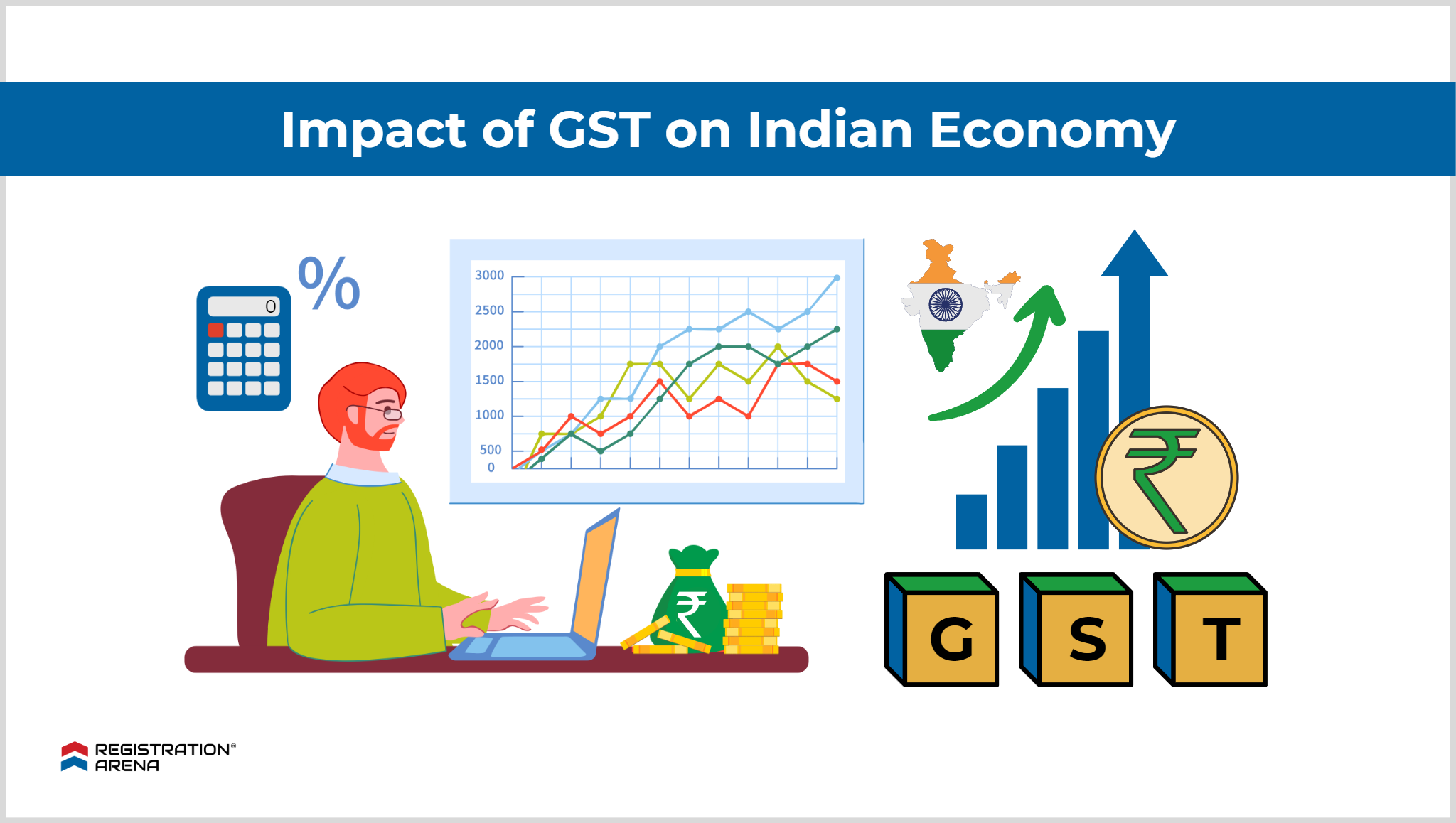In 2017, the introduction of the Goods and Services Tax, commonly known as GST, changed the face of indirect taxes in India. While GST has helped India in becoming a common national market, it has also contributed to inflation to a certain extent. This article discusses the impact of GST on Indian economy, GDP, different sectors of the economy, and the common man.
Overview of GST
To assess the impact of GST on Indian economy, first, we need to understand what is GST and how it has been implemented in India.
What is GST?
GST is a destination-based tax that is levied on goods and services. It means the ultimate burden of GST is on the consumer. However, the idea behind GST is to levy tax only on the value addition which is why it helps in eliminating the cascading effect. Now what is the cascading effect? It simply means tax on tax i.e., double taxation of the same product. All the indirect taxes that were levied in India before GST suffered from the problem of cascading effect.
Implementation of GST in India
India became the 161st country in the world to adopt GST with effect from July 1st, 2017. The aim of introducing GST was to simplify the indirect tax regime in the country with the motto of ‘One nation, one tax’. India has adopted the ‘Dual GST’ model which means the central government as well as the state government will levy GST simultaneously.
GST is levied on the supply of goods and services. Supply is further classified into intra-state supply (within a state or union territory) and inter-state supply (between two states or two union territories or between a state and a union territory). Depending on the type of supply, there are 3 taxes that are levied on goods and services – Central Goods and Services Tax (CGST), State Goods and Services Tax (SGST), and Integrated Goods and Services Tax (IGST). Rates of GST in India are 0%, 5%, 12%, 18% and 28%.
Positive Impacts of GST on the Indian Economy
Following are the positive impacts of GST on Indian economy.
Simplification of Tax Structure
Earlier, there were several indirect taxes in India that were levied on different stages. Therefore, the tax structure was complicated and the businesses were required to comply with different tax laws. GST has simplified the tax structure of the country as it is a single tax levied on different goods and services.
Strong Foothold in International Markets
Exports fall into the category of zero-rated supply under GST. Therefore, the goods that are exported from India are tax-free. As a result, Indian goods became more competitive in the international markets.
Increase in Government Revenue
GST has a wider base which means it covers various goods and services under the tax bracket. Therefore, GST has led to an increase in the tax revenue of the government.
Boost to ‘Make in India’ Campaign
With the introduction of GST, not only the production costs have declined but also compliance has become easier. This has given a boost to the ‘Make in India’ campaign of the government encouraging more production and ultimately a rise in the GDP of the nation.
Reduction in Tax Evasion
GST has reduced the cases of tax evasion in the country because of two reasons. First, there is a system of input tax credit under GST due to which a taxable person can claim credit only on the basis of invoices. Second, the entire process under GST like registration, payment, refund, etc. is carried out on the online portal. Therefore, it is easy to track tax evasion.
Negative Impacts of GST on the Indian Economy
No doubt GST has come a long way in boosting the growth of the Indian economy, but it has some ill effects as well. Following are the negative impacts of GST on the Indian economy.
Inflation
Despite being a single tax, GST increases the price of goods and services. In particular, inflation can be noticed in non-food items which are way costlier than before. Right after the implementation of GST in India, the Consumer Price Index increased by approx. 1%.
Consumer Price Index is an index that measures changes in prices of goods and services that are purchased by households in general.
Increase in Compliance Cost
Reporting framework of GST is stringent as well as comprehensive. A business registered under GST has to file several monthly returns and maintain books of accounts as per the law. Therefore, the compliance cost of businesses has increased post-introduction of GST.
Worried about GST return filing? Don’t worry and connect with our experts now!
Regressive Taxation System
GST is a regressive tax i.e., everyone has to pay the same amount of tax irrespective of his income level. Therefore, it negatively impacts people belonging to low-income groups.
Effect on Small Businesses
In earlier tax regimes, registration was not compulsory for small businesses. For example, it was not necessary for businesses with a turnover of less than Rs. 1.5 crores to take registration under excise law.
Under GST, registration is necessary if aggregate turnover exceeds Rs. 10 lakhs in special category states and Rs. 20 lakhs in other states unless a business opts for a composition scheme. Therefore, even small businesses are required to register themselves and do several compliances.
Impact of GST on Different Sectors
The impact of GST was different in different sectors of the Indian economy. The following are the major sectors that are affected by GST.

Real Estate
The real estate sector contributes nearly 7-8% to the Gross Domestic Product (GDP) of India. In earlier tax regimes, the construction of properties attracted VAT and service tax. As VAT was levied by the state government and service tax was levied by the central government, the benefit of set-off was not available. For example, if a developer has paid service tax on input services and he has to pay VAT as output tax, he cannot take the credit of service tax and use it to pay his VAT liability.
Under GST, developers can take tax credit of input goods and services that are used in the process of construction. Also, they can use this credit to pay their output tax liability. However, GST is not applicable on the sale of completed properties (where the certificate of completion is issued). Therefore, the impact of GST on the real estate sector is positive.
Logistics
Logistics plays a significant role in Indian economy. This sector is the backbone of our developing country. As regards the impact of GST on the logistics sector, it is favorable due to various reasons. First, GST helped in improving the efficiency of the sector. It has been possible due to minimal intervention of authorities during the transit of goods. There is a reduction in transportation time.
Second, the GST law introduced the concept of an E-way bill. There are many advantages of e-way bills. If it has been generated for the transportation of goods, there is no need for the transporter to carry physical papers. This results in less documentation. It also helps in reducing tax evasion as the law provides for hefty penalties in case of non-compliance with rules regarding e-way bills.
Third, GST has helped in improving coordination between buyers and sellers of goods.
Telecom
The Telecom industry of India is the second largest in the world with active users in billions. But after the implementation of GST, the sector has been facing problems. In the earlier regime, the service tax rate in the industry was 15% but under GST, it is 18%.
In addition, the telecom sector buys diesel in significant portions and currently, diesel is outside the purview of GST. As a result, telecom operators cannot take the Input Tax Credit (ITC) on diesel.
FMCG
Fast Moving Consumer Goods, commonly known as the FMCG sector is a key driver of the Indian economy. GST has helped in the reduction of logistics costs in the FMCG sector. Also, the rate of GST on FMCG products is low thereby making the market more competitive. Therefore, the impact of GST on this sector is positive.
Impact of GST on the GDP of India
GDP is an indicator of the performance of an economy. Also, the taxation system affects the GDP of a country as it determines the production level and income of people. GST, as a taxation system, has both positive as well as negative impacts on the GDP of India.
Positive Impact
GST led to the creation of a unified national market in India. It means that the flow of goods and services is seamless throughout the country. In addition, it has encouraged domestic production by simplifying the tax structure. More the production, the higher is the GDP.
Moreover, as already discussed, exports fall under the category of zero-rated supply in GST. This encourages the export of goods from India to other countries. As the value of exports is added to determine GDP, the more the value of exports, the higher the GDP.
Furthermore, the implementation of GST in India has increased the tax revenue of the government. If tax revenue increases, the government can provide better services to encourage production, and hence, GDP rises.
Negative Impact
Directly, there is no negative impact of GST on the GDP of India. But indirectly GST has affected the Indian GDP. GST has induced inflation in India by increasing the prices of goods and services. As a result, the purchasing power of people and consumption level decreased. Ultimately, a decline in consumption level means low GDP.
Impact of GST on the Common Man
Under GST, the final burden of tax is on the consumer of goods and services. They have to pay more taxes on the goods and services that they buy. On the other hand, compliance costs have increased for businesses. Therefore, in the short term, GST has affected the common people of the country negatively.
However, in the long term, it is expected that GST will be beneficial. It has eliminated the cascading effect of taxes that existed in the earlier tax regime. There is a decline in the cost of production as well which might make the goods cheaper in the long run. If prices of goods and services fall, demand will increase leading to more production and ultimately growth of the economy. As a result, there will be more employment opportunities and income levels will rise.
Conclusion
The impact of GST on the Indian economy is positive as well as negative. Some sectors thrived due to the implementation of GST while others are still suffering. However, it has numerous benefits as a taxation system and will benefit the economy in the long run.
Just like it has positively affected the economy, there are several benefits of GST registration as well. We at Registration Arena are dedicated to helping you with the GST registration of our business. Also, our experts will ensure that your returns are filed well on time.
For more information, get in touch with us now!









